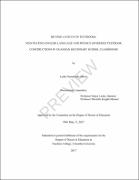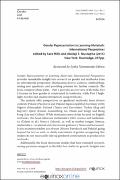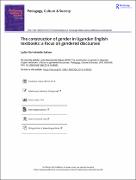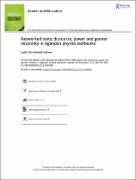| dc.description.abstract | This study exceeded the dominant focus on textbooks to include teacher and
student classroom engagements with them. It was guided by three research questions: i)
In what ways might English and physics textbooks in Ugandan secondary schools
construct gender? ii) How do teachers use gendered texts in the classroom? What
discourses and practices circulate within teacher and student “formal” classroom
interactions around gendered texts? iii) In what ways do teachers and students respond to
gendered constructions within their school textbooks? What discourses and practices are
cited in their responses?
Informed by a feminist post-structural framework, I made use of a qualitative case
study approach, with documentary analysis, classroom observations, and in-depth as well
as group interviews with teachers and students respectively, to tap into discursive
resources that informed negotiation of gender as constructed in English and physics
PREVIEW
textbooks in two diverse school sites in Uganda. The data analysis was undertaken using
feminist post-structural discourse analysis and reflexivity.
My findings revealed firstly, that while gender as constructed in English
textbooks has shifted from invisibility of women to their marginalization, gender as
constructed in physics textbooks continues to privilege a masculine image. Secondly,
contrary to teachers’ claims, their text selection and use was implicitly informed by
gendered essentialist assumptions. Thirdly, teachers and students did not passively take
up gendered images as produced in their textbooks. Rather, they weighed these against
their own understandings, based on which they took up and/or resisted them. As such,
fixing textbooks with more “progressive” gendered images did not guarantee their
legitimation.
The study provides insights into considerations for constructing gender in
textbooks. It also dislodges pervasive assumptions regarding gender as a concern of the
text rather than its readers, demonstrating that teachers and students in fact, bring their
gendered, sexed, raced, classed lenses as filters against which gendered texts are taken up
and/or rejected. The study contributes to the paucity of work on classroom engagements
with gendered texts, student perspectives regarding these texts, gender arrangements
within African science classrooms. It illuminates how discourses are networked, tapping
into discursive resources that inform negotiation of gendered textbooks. | en_US |





